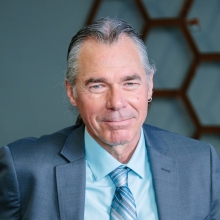May 6, 2024:
The Psychological & Physical Impacts of Perceived Workplace Injustices on Employees
Numerous recent studies have shown that perceptions of injustice are prevalent following occupational injury and increase the risk of delayed recovery. Perceptions of injustice have been shown to contribute to a range of adverse recovery outcomes including more severe pain and disability, mental health problems such as depression and PTSD, and more prolonged work disability. As well, compared to other psychosocial risk factors, perceptions of injustice have been shown to be more resistant to change. Over the past few years, Dr. Sullivan’s group has been involved in a program examining the effectiveness of risk-targeted techniques aimed at preventing or reducing post-injury perceptions of injustice.
This presentation will briefly describe and demonstrate different techniques designed to prevent or reduce perceptions of injustice following occupational injury. It will also make recommendations for changes to administrative and clinical practices that might reduce the prevalence or magnitude of post-injury perceptions of injustice, and in turn, foster more positive recovery outcomes.
Learning Objectives:
By the end of this session, participants will be able to:
-
Attendees will become familiar with recent research on the adverse impact of perceived injustice.
-
Attendees will become familiar with the administration and interpretation of scores on measures of perceived injustice.
-
Attendees will become familiar with techniques designed to reduce perceptions of injustice.
Presenter:
Michael Sullivan, PhD
Professor of Psychology, Medicine and Neurology at McGill University; Canada Research Chair in Behavioural Health
Dr. Michael Sullivan is currently Professor of Psychology, Medicine and Neurology at McGill University. He has lectured nationally and internationally on the social and behavioral determinants of pain-related disability. Dr. Sullivan’s research addresses psychosocial risk factors for delayed recovery. Dr. Sullivan and his team have developed several instruments to assess psychosocial risk factors including the Pain Catastrophizing Scale (PCS), the Injustice Experiences Questionnaire (IEQ), and the Perceived Deficits Questionnaire (PDQ). Dr. Sullivan also developed the Progressive Goal Attainment Program (PGAP); the first community-based intervention program designed to target psychosocial risk factors for pain-related disability (https://www.pgapworks.com/en/). In 2011, Dr. Sullivan received the Canadian Psychological Association Award for Distinguished Contributions to Psychology as a Profession.
Agenda
10:00am: Welcome, Overview | Dr. Edward Alvino, Dr. Taha Ahmad, Dr. Pouran Faghri
10:05am: Dr. Michael Sullivan: The Psychological and Physical Impacts of Perceived Workplace Injustices on Employees.
11:25am: Q&A. Moderators: Dr. Alvino, Dr. Ahmad, Dr. Faghri
11:55am: Closing Remarks
Series Overview:
Depression, anxiety, and substance abuse can result in interpersonal conflict, workplace violence, reduced productivity, lost work time, and many other problems. This webinar series will cover different topics biannually.
Expect topics on:
-
How productivity is affected by mental health and how to promote mental health in the workplace
-
Recognizing behavioral health impairments and promoting a healthy degree of focus in the workplace
-
Lifestyle factors that influence behavioral health
-
Overcoming COVID-19 related anxieties
-
Early recognition and appropriate related therapy to maintain productivity in the workplace
-
Employer and employee rights
-
And much more!
This webinar series will:
-
Define the scope and the impact of behavioral health conditions in the workplace.
-
Explain the extent to which behavioral health conditions compromise an employee’s productivity, absenteeism, and cost.
-
Discuss the behavioral health conditions that most commonly contribute to issues in the workplace.
-
Evaluate utilization of psychotherapy and psychopharmacology in the outlined patient population.
-
Present programs that have successfully addressed early, safe return to work, workplace health and safety, and appropriate accommodation.
Series Learning Objectives:
-
Describe the impact of behavioral health conditions on both the employer and the employee.
-
Recognize behavioral health conditions that commonly limit an employee’s productivity.
-
Summarize available programs shown to increase productivity and decrease absenteeism in employees with these conditions.
-
Review the appropriate treatment that may promote the most appropriate, safe return to work.
-
Formulate workplace accommodations that may facilitate and maintain a successful return to work/stay at work.
* Each presentation will have its learning objectives
Who Should Attend?
This is intended for physicians, physician assistants, nurses, nurse practitioners, industrial hygienists, safety professionals; and accommodations, disability and human resources specialists, employers, supervisors, union representatives and members of health and safety committees.
Symposium Planning Committee
Edward C. Alvino, MD, Chief Medical Officer, UNUM
Taha M. Ahmad MD, MPH, FACP, Chief of Service, Occupational Health Services
Kaiser Permanente Panorama City
Pouran D. Faghri, MD, MS, FACSM, Adjunct Professor, School of Public Health at University of California, Los Angeles
Previous Sessions:
December 6, 2023: Healthy Leadership
An Overview of Evidence-Based Strategies for Supporting Worker Mental Health
This session will explore the critical role of healthy leadership in supporting workers’ work-life balance and mental health. The session is designed to provide evidence-based insights and practical guidance on how leaders of people (i.e., senior leaders, managers, supervisors) can support and protect employee work-life integration and mental health through proactive and responsive supportive strategies. A review of workplace psychosocial risk factors will be included along with a general discussion about how the workplace is a missing link in understanding and promoting population mental health.
Learning Objectives:
-
Understand work-life balance and conflict and mental health, from an occupational health and management perspective
-
Understand how managers and front-line supervisors can support and promote work-life balance and mental health in the workplace
-
Understand the warning signs associated with deteriorating mental health
-
Learn how managers can recognize warning signs and provide support to employees experiencing declines in mental health and well-being
Leslie Hammer, PhD
Professor and Associate Director of Applied Research at Oregon Institute of Occupational Health Sciences, Co-Director at Oregon Healthy Workforce Center, OHSU
Dr. Leslie Hammer is the Associate Director for Applied Research in the Oregon Institute of Occupational Health Sciences and Co-Director of the Oregon Healthy Workforce Center, Total Worker Health® center of excellence, at Oregon Health & Science University. She is also a Professor Emerita at Portland State University and a leading international expert on workplace mental health, work and family, and occupational stress. She specializes in the mental and physical health effects of supportive supervision at work and has extensive experience in designing, implementing, and evaluating worksite interventions and evidence-based supervisor training, including the Family Supportive Supervisor Behavior (FSSB) training and the Mental Health Supportive Supervisor Behavior (MHSSB) training.
April 27, 2023:
Addressing the Burnout Epidemic: Work Stress & Creating Healthy Work
Learning Objectives:
-
Define burnout, its components, and evaluate the problems associated with measuring the prevalence of burnout.
-
Recognize the major sources of work-related stress that contribute to burnout or its components.
-
Review some intervention research models that have been successful in reducing workplace burnout.
-
Use the Healthy Work Survey and other tools to determine sources of stress that may contribute to burnout in the workplace.

Marnie Dobson, PhD
Assistant Adjunct Professor at University of California at Irvine, Associate Director of Center for Social Epidemiology, Center for Occupational and Environmental Health
Dr. Marnie Dobson is currently the Director of the Healthy Work Campaign and the Associate Director of the Center for Social Epidemiology, a non-profit organization and sponsor of the HWC. She is an Assistant Adjunct Professor at the University of California, Irvine, Center for Occupational and Environmental Health and has specialized in occupational health and work stress research with various working populations for over 16 years. The Healthy Work Campaign is a public health campaign focused on raising awareness in the U.S. about the impacts of work stress on mental and physical health. In collaboration with a research team, she developed the Healthy Work Survey and other intervention tools to guide organizations in preventing occupational diseases caused by stress and designing healthier work.

Peter Schnall, MD, MPH
University of California at Irvine, Director of Center for Social Epidemiology, Center for Occupational and Environmental Health
Dr. Peter Schnall is the Co-Director of the Healthy Work Campaign, as well as the Founder and Director of the Center for Social Epidemiology. An epidemiologist, Peter has studied the impact of working conditions on the development of hypertension among workers for over 30 years, as well promoting increasing awareness among students, colleagues and the public of the important role psychosocial work stressors play in the development of chronic mental and physical illnesses. His role as Co-Director of the Healthy Work Campaign includes supervising the HWC in collaboration with the HWC team, developing contacts and relationships with potential HWC partners, and as a writer of web pages, blogs, and other materials to promote the Campaign.
October 19, 2022:
Substance Use & Addiction in the Workplace: Implications for Interventions

Stuart Gitlow, MD, MPH, MBA
Board Certified in Psychiatry, Forensic Psychiatry, and Addiction Medicine; Past President of the American Society of Addiction Medicine
Dr. Gitlow, Immediate Past President of the ASAM Board of Directors, is an Aviation Medical Examiner specializing in addiction and psychiatric issues for the Federal Aviation Administration. He served in the past as Chair of the AMA’s Council on Science and Public Health. Dr. Gitlow serves as ASAM’s delegate to the AMA. Board certified in general, addiction, and forensic psychiatry, Dr. Gitlow has an active addiction medicine practice. Graduate of MIT and Mount Sinai School of Medicine, Dr. Gitlow’s psychiatric and public health training took place in Pittsburgh, following which he went to Harvard for his forensic fellowship. Dr. Gitlow formerly produced both Health Channel and ABC programming at America Online.

Timothy W. Fong, MD
Psychiatrist at Resnick Neuropsychiatric Hospital, Professor at UCLA Semel Institute for Neuroscience, UCLA Gambling Studies Program, UCLA Cannabis Research Initiative
Dr. Fong is a Professor of Psychiatry at the Semel Institute for Neuroscience and Human Behavior at UCLA and he is board certified in adult and addiction psychiatry. He is the co-director of the UCLA Gambling Studies Program. The purpose of this program is to examine the underlying causes and clinical characteristics of gambling disorder in order to develop effective, evidence-based treatment strategies. Dr. Fong is also part of the Steering Committee of the UCLA Cannabis Research Initiative whose mission is to address the most pressing questions related to the impact of cannabis legalization through rigorous scientific study and discourse across disciplines. Clinically, he is the Director of the UCLA Addiction Psychiatry Consultation Service and is an Attending Physician in the UCLA Addiction Psychiatry Clinic and the Breathe Well, Be Well program.
Dr. Gitlow: Substance Use – Order or Disorder?
Learning Objectives- Healthcare providers & physicians will be able to:
-
Differentiate among occasional substance use, unhealthy substance use, and addictive disease
-
Identify strategies to detect impairment at the workplace related to substance use
-
Recognize the limitations and restrictions that can arise in the workplace from substance use
-
Utilize patient engagement strategies to enhance compliance with evidenced-based substance use evaluations and treatments
-
Promote return to function in patients impaired from substance use, as compatible with the patient’s health and safety in the workplace
Dr. Fong: Practical Solutions on Addressing Substance Use in the COVID-World Workplace.
Learning Objectives:
-
Name three consequences of COVID-19 on the impact of substance use for individuals working from home
-
Promote acceptable workplace behaviors through implementation of drug/alcohol testing
-
Implement appropriate substance-free policies at the workplace and understand the steps involved in dealing with non-compliance
-
Recommend valuable information for educating employees about substance use consequences and how a substance-free workplace is supportive to health and wellness
-
Review current federal and state of California policies regarding cannabis use in the workplace (in-person or for those working from homes
April 27, 2022:
Behavioral Factors of COVID-19 in the Workplace
Keith Caruso, MD, FAPA, Forensic Psychiatrist.
Mental Health in the Workplace: COVID-19 and Psychiatric Disorders.
Learning Objectives:
-
Identify high-risk groups and common diagnoses for COVID -19 pandemic related psychiatric illnesses.
-
Identify psychiatric responses to mask and vaccine mandates.
-
Identify the overall impact of the COVID-19 pandemic on mental health in the psychiatric patients and the general population.
Robert Bilder, PhD, ABPP-CN, UCLA Michael E. Tennenbaum Family Distinguished Professor of Psychiatry & Biobehavioral Sciences and Psychology; Chief, Division of Psychology; UCLA Geffen School of Medicine; Semel Institute for Neuroscience at UCLA; Resnick Neuropsychiatric Hospital at UCLA.
Dimensions of Psychological Well-Being in the Workplace: Life in the Time of COVID-19.
Learning Objectives:
-
Describe at least two components of psychological well-being.
-
Describe at least two ways to increase psychological well-being.
-
State at least two ways that psychological well-being has been impacted by COVID-19.
September 21, 2021:
Optimizing Mental Health in the Workplace
Karen Miotto, MD, Professor of Clinical Psychiatry, University of California Los Angeles; Chair, UCLA Physician Wellness Program and Medical Staff Health Committee
Mental Health in the Workplace: Presentations & System Solutions
Robert C. Larsen, MD, MPH, Director, Center for Occupational Psychiatry, Oakland, CA & Retired, Clinical Professor of Psychiatry, UCSF School of Medicine
Wounded Workers: Victims, Victors & the Very Fortunate
Learning Objectives:
-
Identify common mental health disorders in the workplace
-
Define evidence-based approaches to improving employee mental health
-
Explain tactics for leading multiple generations in the workplace
-
Identify a range of human responses that include victimization but also post-traumatic growth, resilience rather than impairment, forced adaptation in the difficult/impaired employee, and unexpected positive outcomes brought forth by selective advocacy.
Other Registration Options
Call Us: 310-206-2304
Email Us: erc@ph.ucla.edu




